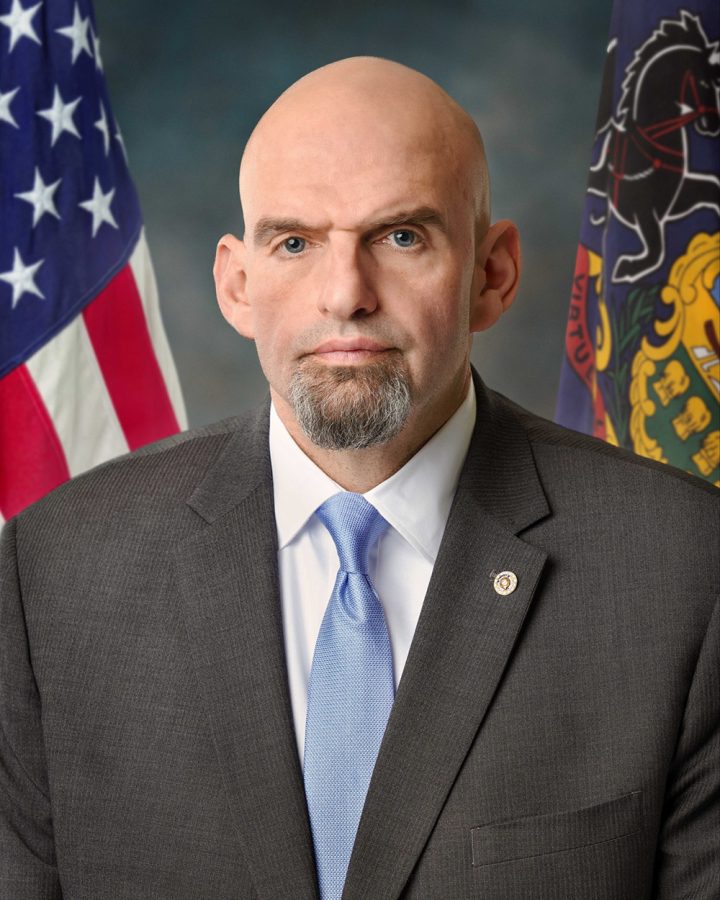Wins, losses in midterms
Democrats gain in Senate, GOP takes over House.
John Fetterman was elected to represent Pennsylvania in the United States Senate this past midterm election.
May 11, 2023
The ballots have been counted and races have been called for the 2022 Midterm elections, leaving both sides of the aisle disappointed.
For Republicans, the prevailing storyline was the underperformance of candidates nationwide. Despite polls illustrating Republicans winning the Senate by as many as four seats, the GOP remained the minority party. And while they did manage to secure a slim nine-seat majority in the House of Representatives, it was a much tighter gap than pundits had anticipated.
In spite of continuing control of the Senate, the Democrats were displeased that some candidates, such as now-Senator J.D. Vance (R), deemed an “Ultra MAGA” Trump loyalist, would be joining them on the Hill. Losing the House was expected by the Democrats — in fact, losing by such a small margin could be considered a moral victory.
Yet, the loss of the House results in a drastically different reality in Washington.
Democrats performed well in gubernatorial elections, winning most toss-up races – including impressive flips in Massachusetts and Arizona.
The Arizona governor’s race had been one of the most anticipated showdowns of the election cycle, as far-right Kari Lake (R) and former Arizona Secretary of State Katie Hobbs (D) remained very close in the polls leading up to the election. Ultimately, Hobbs pulled through and won the governor’s seat. Lake, meanwhile, has filed lawsuits against various Arizona counties, a futile attempt to decertify the election results. Following her lead, some rural counties in the state refused to certify their results. Hobbs, however, still serving in her role as Secretary of State, oversaw the eventual certification of the results and was inaugurated on January 5.
Lake has yet to concede defeat.
In Pennsylvania, Democrats won both major statewide races with Attorney General Josh Shapiro winning the governor’s race by 14 points, as expected. However, the Republicans faced a major setback in the Senate race since Lieutenant Governor John Fetterman (D) defeated TV Doctor Mehmet Oz (R) by 4.6 points. As a result of the Republicans losing the Pennsylvania race, party control was lost in the Senate.
The Georgia elections saw successes for both parties. Incumbent Governor Brian Kemp (R) once again defeated Stacy Abrams (D) in her bid for the governor’s seat in the peach state, which was expected based on the polling. In the Senate, the race between Herschel Walker and Raphael Warnock went into a runoff due to neither of the candidates being able to obtain 50 percent of the popular vote. Moreover, the theory that runoff elections normally favor Republicans was once again proven false with Warnock winning the election by narrow margins.
The Nevada election was another that illustrates the inaccuracy of the polling. The Real Clear Politics (RCP) average showed GOP Senate candidate Adam Laxalt up by 3.4 points, however, incumbent Senator Catherine Cortez Mastro defeated Laxalt by a narrow .9 points.
Additionally, the New York governor’s race may have been a win for the Democrats yet the Empire State played host to rare Republican gains. Kathy Hochul (D) defeated GOP candidate Lee Zeldin by only 5.8 points, a narrow margin of victory for a Democrat in New York.
Zeldin’s relative success in the governor’s race was reflected in GOP wins in typical Democratic strongholds. Redistricting that occurred in 2020 is also viewed as a factor that led many Republicans to win in New York. Those losses in House races by NY Democrats helped pave the way for the GOP’s majority there.
The Ohio senate race was one of the few competitive races in which polling predictions held true. The RCP average from the day before the election had Trump-endorsed candidate J.D. Vance up by 8 points and was proven true, defeating former representative Tim Ryan by 6.6 points in the election, making the current senator one of the few non-incumbent Trump-backed senate candidates to win their election.
Now that the 2024 elections are surfacing as a significant topic among Americans, hopefully both parties will focus on what the people need and will prioritize kitchen table issues rather than those of partisan politics.

